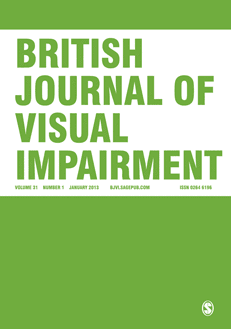
British Journal of Visual Impairment
Scope & Guideline
Fostering dialogue on visual impairment challenges.
Introduction
Aims and Scopes
- Research on Education and Inclusion:
The journal extensively covers topics related to inclusive education practices, teaching strategies, and the participation of students with visual impairments in educational settings. This includes the development and validation of educational tools and curricula tailored for visually impaired learners. - Health and Wellbeing:
A significant focus is placed on the psychological and physical health of individuals with visual impairments. This includes studies on mental health issues like anxiety and depression, as well as interventions aimed at improving overall wellbeing. - Assistive Technology and Rehabilitation:
The journal explores the role of technology in aiding individuals with visual impairments, including the effectiveness of various assistive devices and rehabilitation programs designed to enhance independence and quality of life. - Social Inclusion and Community Engagement:
Research on social participation, community support, and the lived experiences of individuals with visual impairments is prevalent. This includes qualitative studies that highlight the social barriers faced by these individuals and the implications for policy and practice. - Methodological Innovations:
The journal supports innovative research methodologies, including mixed-methods and participatory approaches, to better understand the complexities surrounding visual impairment and to inform future research directions.
Trending and Emerging
- Intersectionality in Research:
There is a growing emphasis on intersectionality, exploring how various social identities (e.g., gender, socioeconomic status, disability) intersect to affect the experiences of individuals with visual impairments. This approach acknowledges the nuanced challenges faced by diverse groups within the visually impaired community. - Mental Health and Psychological Wellbeing:
Recent studies are increasingly addressing the mental health challenges faced by individuals with visual impairments, particularly in the context of societal changes and the COVID-19 pandemic. This trend underscores the importance of psychological support and interventions tailored to this population. - Technological Integration and Digital Inclusion:
Papers focusing on the role of technology in enhancing accessibility and independence for individuals with visual impairments are on the rise. This includes research on mobile applications, online learning tools, and assistive devices that facilitate better engagement in various aspects of life. - Community and Social Participation:
Emerging research highlights the importance of social participation and community engagement for individuals with visual impairments. Studies are increasingly focusing on the lived experiences of these individuals and the barriers they face in social contexts. - Cultural Perspectives and Global Contexts:
There is an increase in research that examines visual impairment within specific cultural contexts, considering how cultural beliefs and practices influence the experiences and treatment of individuals with visual impairments. This trend reflects a broader understanding of the global diversity of experiences.
Declining or Waning
- Traditional Rehabilitation Approaches:
There is a noticeable decline in research focused solely on traditional rehabilitation methods without the integration of modern technology or holistic approaches. This suggests a shift towards more comprehensive, innovative rehabilitation strategies that incorporate technology. - Generalized Studies on Visual Impairment Prevalence:
Research that merely documents prevalence rates of visual impairment without exploring underlying causes or implications appears to be less frequent. This indicates a transition towards studies that emphasize understanding the complexities and contextual factors affecting individuals with visual impairments. - Exclusively Clinical Perspectives:
Papers that focus solely on clinical characteristics and treatment outcomes without considering the psychosocial aspects of living with visual impairment are becoming less common. The current trend favors a more integrated approach that encompasses both medical and social dimensions.
Similar Journals
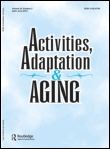
Activities Adaptation & Aging
Fostering dialogue to enrich the lives of older populations.Activities Adaptation & Aging is a leading journal dedicated to the intersection of aging research, health professions, and gerontology, published by Routledge Journals, Taylor & Francis Ltd. With its origins dating back to 1981, this journal has established itself as a vital resource for scholars and practitioners alike, focusing on innovative approaches to enhance the quality of life for older adults. The journal’s inclusion in various prestigious Scopus ranks—such as being positioned in the 92nd percentile for Health Professions (miscellaneous)—reflects its significant impact in the field. Operating without open access, it provides essential insights and empirical research that are crucial for advancing knowledge and practices related to adaptation and engagement in aging. With a strong reputation built over the decades, Activities Adaptation & Aging continues to be an essential platform for disseminating research findings, fostering scholarly dialogue, and promoting effective interventions for aging populations.
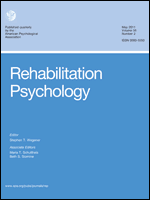
REHABILITATION PSYCHOLOGY
Transforming Lives with Psychological InsightsRehabilitation Psychology, an esteemed journal published by the Educational Publishing Foundation - American Psychological Association, serves as a premier platform for high-quality research in the interdisciplinary fields of clinical psychology, rehabilitation, and physical therapy. With an impressive impact factor reflective of its rigorous publication standards, it maintains a Q1 ranking in Clinical Psychology and Rehabilitation, establishing itself as a vital resource for researchers and practitioners dedicated to enhancing mental health and recovery processes. Since its inception in 1982, Rehabilitation Psychology has continuously adapted to the evolving landscape of psychological and physical rehabilitation, offering insights and innovative approaches to both clinicians and the academic community. Although it is not an open-access journal, its contributions are critical for those seeking to advance their understanding of rehabilitation practices and improve the quality of care for individuals recovering from various psychological and physical challenges. Located in the United States, the journal is committed to fostering collaboration and knowledge exchange among professionals dedicated to the enhancement of rehabilitation science.

Journal of Empirical Theology
Advancing Scholarly Dialogue in Religious StudiesJournal of Empirical Theology, published by BRILL, stands as a leading forum for scholarly discourse in the field of religious studies, boasting an impressive Q1 ranking in 2023. With a legacy that spans from 1988 to 1994 and again from 2010 to 2024, this journal offers critical insights and empirical research that bridge theology and the broader social sciences. The journal fosters interdisciplinary dialogue, encouraging contributions that explore the practical implications of theological concepts on contemporary issues, appealing to researchers, professionals, and students alike. While it is not an open-access publication, the Journal of Empirical Theology provides an essential platform for innovative ideas and methodologies, contributing significantly to the academic landscape in the Netherlands and beyond. Whether examining the nuances of religious practice or engaging with theoretical frameworks, this journal plays a vital role in advancing our understanding of the dynamic interactions between faith, culture, and society.
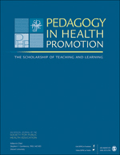
Pedagogy in Health Promotion
Integrating evidence-based approaches into health education.Pedagogy in Health Promotion is a pivotal journal published by SAGE Publications Inc, dedicated to advancing educational practices in the field of public health. With an ISSN of 2373-3799 and an E-ISSN of 2373-3802, this esteemed journal has positioned itself within the Q3 quartile for Public Health, Environmental, and Occupational Health, ranking #328 out of 665 in Scopus. Since its inception in 2015, it has provided a platform for innovative research, pedagogical strategies, and theoretical discussions aimed at integrating effective health promotion into educational settings. Though currently available through subscription, the journal is committed to enhancing accessibility to vital health education resources for both scholars and practitioners. Its mission is to foster interdisciplinary collaboration and to empower educators, public health officials, and students to implement evidence-based health promotion strategies that can effectively address contemporary public health challenges.
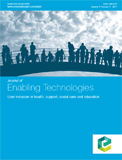
Journal of Enabling Technologies
Elevating Standards in Technology and Health SciencesThe Journal of Enabling Technologies, published by EMERALD GROUP PUBLISHING LTD, stands as a pivotal resource within the realms of Computer Science Applications, Health (Social Science), and Management of Technology and Innovation. Established in 2017 and converging towards its 2024 target, the journal has garnered significant recognition, reflected in its Q3 classification in multiple categories for 2023 and a commendable Q2 ranking in Rehabilitation. It holds respectable standings in Scopus rankings, notably positioning itself at the 38th percentile in Rehabilitation and 71st in Health Social Sciences. Aimed at promoting knowledge and innovation, the journal serves as an essential platform for researchers, professionals, and students, enabling them to explore advancements, share insights, and foster interdisciplinary collaboration. Although it does not offer open access, its impact factor and authoritative standing in the field underscore its importance for anyone dedicated to enhancing technology utilization across these vital sectors.
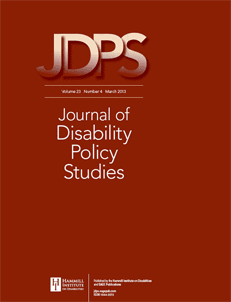
Journal of Disability Policy Studies
Bridging gaps in disability studies and practice.The Journal of Disability Policy Studies, published by SAGE Publications Inc, stands as a pivotal scholarly resource in the field of disability studies, intersecting the domains of health and law. Established in 1990, this peer-reviewed journal has cultivated a rich legacy of disseminating high-quality research, evidenced by its impressive rankings within the Q2 and Q1 quartiles respectively in Health (Social Science) and Law as of 2023. With a significant impact factor reflected in its Scopus rankings, positioning it in the 88th percentile in Law and the 60th percentile in Health, the journal serves as an essential platform for scholars and practitioners dedicated to advancing the nuanced understanding of policy issues affecting individuals with disabilities. The journal not only stimulates academic discourse but also provides valuable insights aimed at informing policy development and implementation, making it an indispensable resource for researchers, professionals, and students alike.

ADAPTED PHYSICAL ACTIVITY QUARTERLY
Empowering Movement for All.ADAPTED PHYSICAL ACTIVITY QUARTERLY is a leading peer-reviewed journal published by Human Kinetics, dedicated to the exploration of innovative approaches in adapted physical activity. Established in 1988, this esteemed journal serves as a crucial platform for researchers, practitioners, and students in the fields of Physical Therapy, Sports Therapy, and Rehabilitation, boasting a commendable Impact Factor and a solid reputation reflected in its Q2 quartile ranking in Physical Therapy and Rehabilitation, as well as Q3 in Sports Science according to the latest metrics. With a clear focus on enhancing the quality of life through physical activity, ADAPTED PHYSICAL ACTIVITY QUARTERLY encourages groundbreaking research and discussion on the development of adapted physical practices. Researchers in related disciplines will find a wealth of insightful studies, timely discussions, and practical applications aimed at promoting inclusive fitness and rehabilitation. As a non-open access journal, ADAPTED PHYSICAL ACTIVITY QUARTERLY is essential for those committed to advancing the understanding and implementation of adapted physical activities across diverse populations.
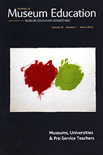
Journal of Museum Education
Fostering interdisciplinary dialogue for enriched museum education.Journal of Museum Education, published by Routledge Journals, Taylor & Francis Ltd, serves as a vital platform for the exchange of ideas and research in the fields of education and museology. With an ISSN of 1059-8650 and E-ISSN 2051-6169, this journal not only holds a prestigious Q2 ranking in Education and a Q1 ranking in Museology for 2023, but it also enriches the academic landscape by positioning itself among the top ten percent in the museology category. Spanning a converged publishing period from 2014 to 2024, the journal aims to foster interdisciplinary dialogue among museum professionals, educators, and researchers by addressing critical issues in museum-based learning and engagement. Although it operates under a subscription model, its compelling scope and focus on innovative educational practices make it an indispensable resource for those committed to enhancing museum education. By contributing to the Journal of Museum Education, authors engage with an audience dedicated to advancing scholarship and practice in this essential area of the arts and humanities.
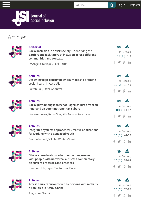
Journal of Social Inclusion
Advancing Social Equity Through Inclusive ResearchJournal of Social Inclusion, published by Griffith University, School of Human Services & Social Work, is an esteemed open-access journal dedicated to the exploration and dissemination of knowledge within the intersection of social sciences, sociology, and health. Available freely to readers since its inception in 2010, this journal strives to promote inclusive practices and policies that advance social equity and justice, making it a vital resource for researchers, practitioners, and students alike. With a focus on diverse topics that encapsulate the complexities of social inclusion, the journal aims to bridge academic research with real-world implications, fostering a deeper understanding of marginalized groups and challenges within society. Despite its current standing in the Q4 quartile across various Scopus categories, the journal is committed to uplifting discussions and innovations that can significantly contribute to the ongoing dialogue in the fields of social work and health professions. As you navigate the dynamic landscape of social inclusion, the Journal of Social Inclusion serves as a platform for transformative ideas and impactful research.

STAPS-Sciences et Techniques des Activites Physiques et Sportives
Transforming the Landscape of Sports Science and EducationSTAPS-Sciences et Techniques des Activites Physiques et Sportives, published by DE BOECK UNIV in Belgium, is a distinguished journal focused on the fields of physical education, sports science, and rehabilitation. With an ISSN of 0247-106X and an E-ISSN of 1782-1568, this journal provides a scholarly platform for dissemination of research across various relevant fields including Orthopedics, Sports Medicine, and Physical Therapy. Although currently categorized in Q4 quartile across its fields, STAPS serves as a valuable contributor to discussions on the scientific basis of physical activities and sports, aiming to bridge theory and practice. The journal exhibits a broad scope, addressing not only physiological and psychological aspects but also cultural studies related to sports. STAPS is essential for researchers, professionals, and students seeking to stay updated on evolving methodologies and innovative practices within the realm of physical activity sciences.